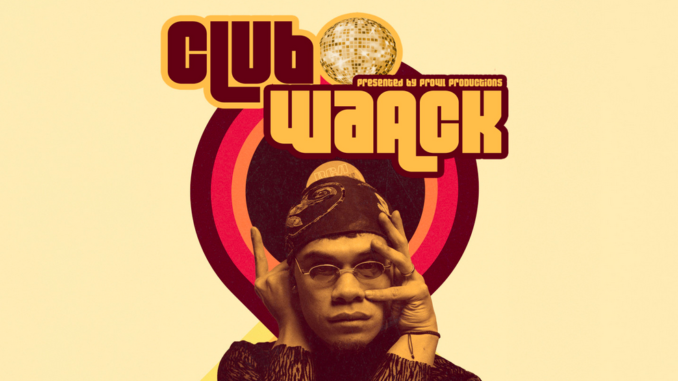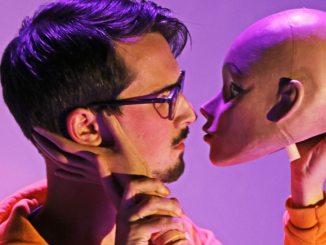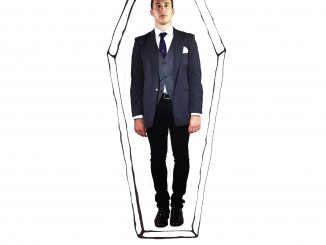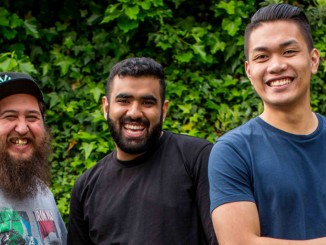
[Not So Moving]
Disco beats are all over today’s pop music. Flared pants are making a comeback. And the dance style of waacking is more mainstream than ever. So it seems appropriate to take a look back at 70s culture and where it really came from – that is, queer POC nightclub scenes. It’s natural that Prowl Productions, who specialise in waacking and street dance styles, would want to bring this history to our stages.
Club Waack, devised with the cast by co-directors Andrew Cornish and Hayley Walters-Tekahika, promises to be a groovy and fantastical ride, and it does partially deliver. Basement Theatre’s back wall is adorned with a disco ball and hanging records that sparkle under Rae Longshaw-Park’s funky lighting. The dancers who make up the bulk of the cast are impressive, delivering sharp, high-energy performances. However, the story is extremely lacking.
The show seems to oscillate between a rather general overview of queer history – acted out (somewhat awkwardly) by the cast and later via projected documentary and news footage – and the story of the dancers at the titular ‘Club Waack’. The club, started by Mama Doll (Princess Halatoa) as a safe haven for queer/POC to express themselves, comes under threat from the overly moralising members of the Standards Protecting Communities Everywhere, or SPCE (Alice Pearce and Vena-Rose Lennane). Though there is a hint of the sassy but loving relationship between Mama Doll and the dancers, these characters and their dynamics are woefully underdeveloped. It is unfortunate, because these characters should have been our emotional anchor, but instead I find myself barely caring what happens to them or the club. The dance sequences were certainly fun and peppy, but I couldn’t fully appreciate them because they failed to be grounded by the story. Considering this is Prowl Productions’ first foray into more narrative-based theatre, they would’ve greatly benefitted from consulting a dramaturg.
My main critique of the show is that it lacks focus. It tries to cover 50 years of queer history, as well as the history of the dance form ‘waacking’, and deliver a story about a fictional club, all in a 60-minute piece. The ‘acting out moments of history’ sequence at the beginning felt clunky and could easily have been straight narration. Our introduction to the characters at the club happened during this sequence as well, but very out of context, which left me somewhat confused. Without a particular throughline, the moments from history they chose to highlight felt a little random, and there was a mixing of American and New Zealand history which again muddied the focus. The projected footage was likewise too generic and arbitrary. If you have any familiarity with queer history, the information presented will be largely nothing new. For something that took up a lot of runtime (and left some dead space on stage while the projector screen was being pulled up and down) it didn’t add much to the conversation.
The SPCE villains were reduced to caricatures and, though they certainly held extreme beliefs by today’s standards, I feel it does a disservice to queer history to remember them in this way. These were real people who believed homosexuality was dangerous, and to not treat them as such removes nuance from the conversation. These caricatures might’ve worked if, tonally, the show was more absurd and romp-y, but there were scenes which made it clear we were supposed to take these issues seriously.
Pearce, Halatoa and Hone Taukiri (MC Pita Donovan) were the stand-out performers in terms of acting, managing to anchor their larger-than-life characters in some sense of authenticity, and confidently holding the space.
Though certainly a fun night out, Club Waack overall failed to meaningfully engage with the issues and themes it brought up. Everything was overly simplified and surface level due to a lack of focus. However, the history of queer culture and rights are interesting and important topics, and I would love to see Prowl Productions develop this work dramaturgically. Perhaps narrowing the focus to the history of waacking, or queer history specifically in Aotearoa, or just to the story of the club, would help it to explore these ideas with more depth. I’d be interested to see how dance could be more seamlessly integrated into the theatrical modes employed – how dance might be used to tell these stories more abstractly, emotively and creatively.
Club Waack plays Basement Theatre 12th to the 16th of September 2023.




Leave a Reply